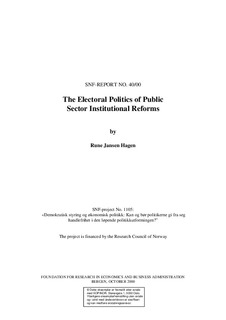| dc.contributor.author | Hagen, Rune Jansen | |
| dc.date.accessioned | 2006-07-06T07:14:15Z | |
| dc.date.available | 2006-07-06T07:14:15Z | |
| dc.date.issued | 2000-10 | |
| dc.identifier.isbn | 82-491-0070-0 (trykt versjon) | |
| dc.identifier.issn | 0803-4036 | |
| dc.identifier.uri | http://hdl.handle.net/11250/164669 | |
| dc.description.abstract | For politicians in office, reforming public sector institutions is an investment; they must spend resources now in order to achieve future gains. There are no property rights attached to these institutions. Therefore, politicians need to remain in control if they are to reap the full benefits of reform. When the probability of re-election is unaffected by the reform choice, political polarisation between incumbent and challenger results in a lower critical value for the cost of investment by reducing the benefits of reform compared to a benchmark of no uncertainty. The reduction in the cut-off rate is increasing in the degree of polarisation. However, if undertaking reforms increase this probability, the likelihood of investment might increase, the more so the greater the polarisation in preferences. | en |
| dc.format.extent | 194223 bytes | |
| dc.format.mimetype | application/pdf | |
| dc.language.iso | eng | en |
| dc.publisher | SNF | en |
| dc.relation.ispartofseries | Report | en |
| dc.relation.ispartofseries | 2000:40 | en |
| dc.title | The electoral politics of public sector institutional reforms | en |
| dc.type | Research report | en |
